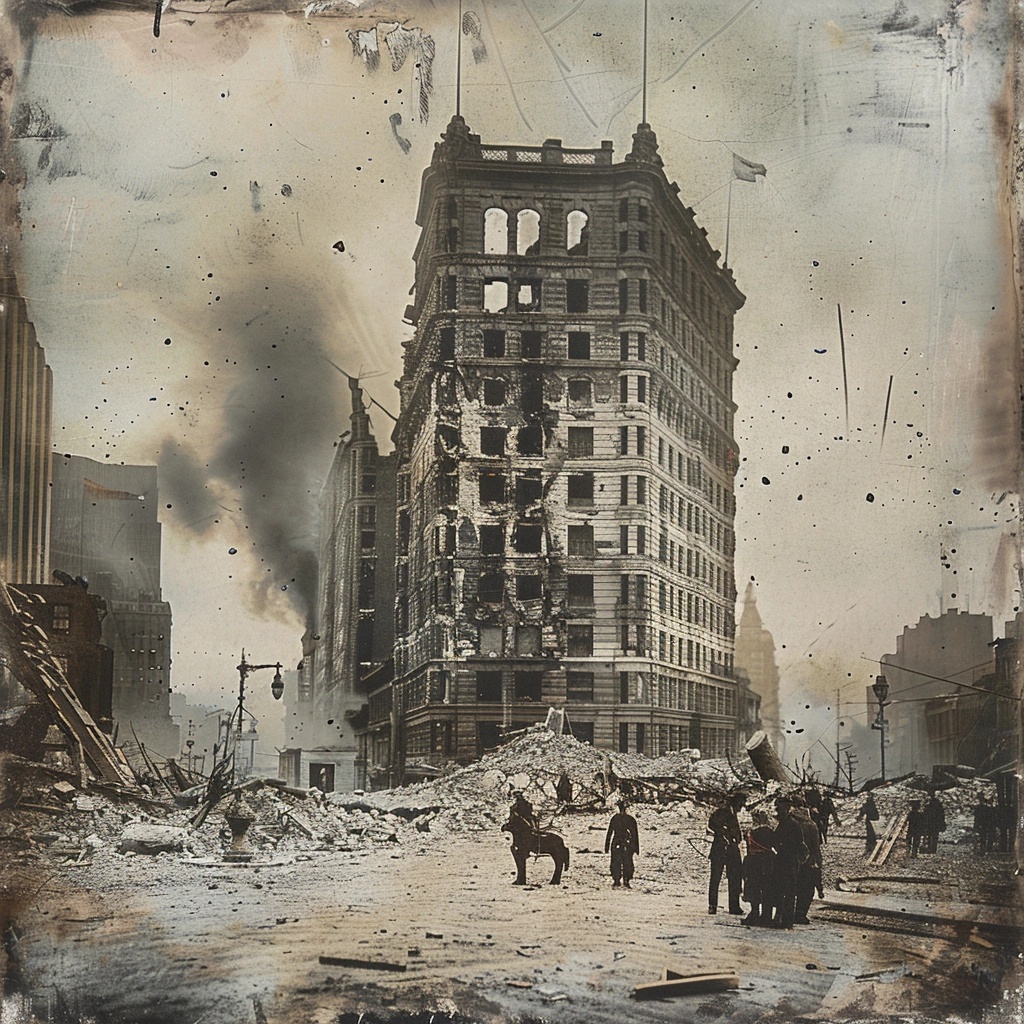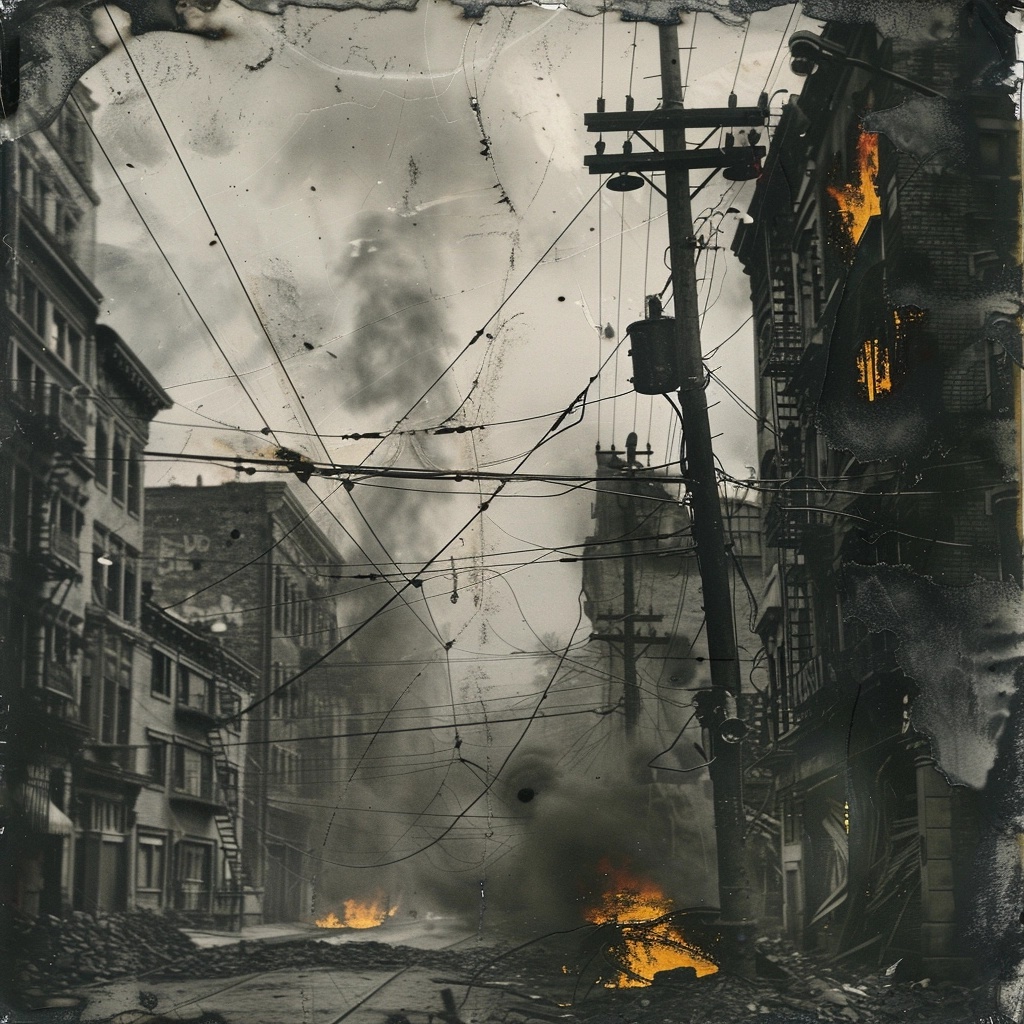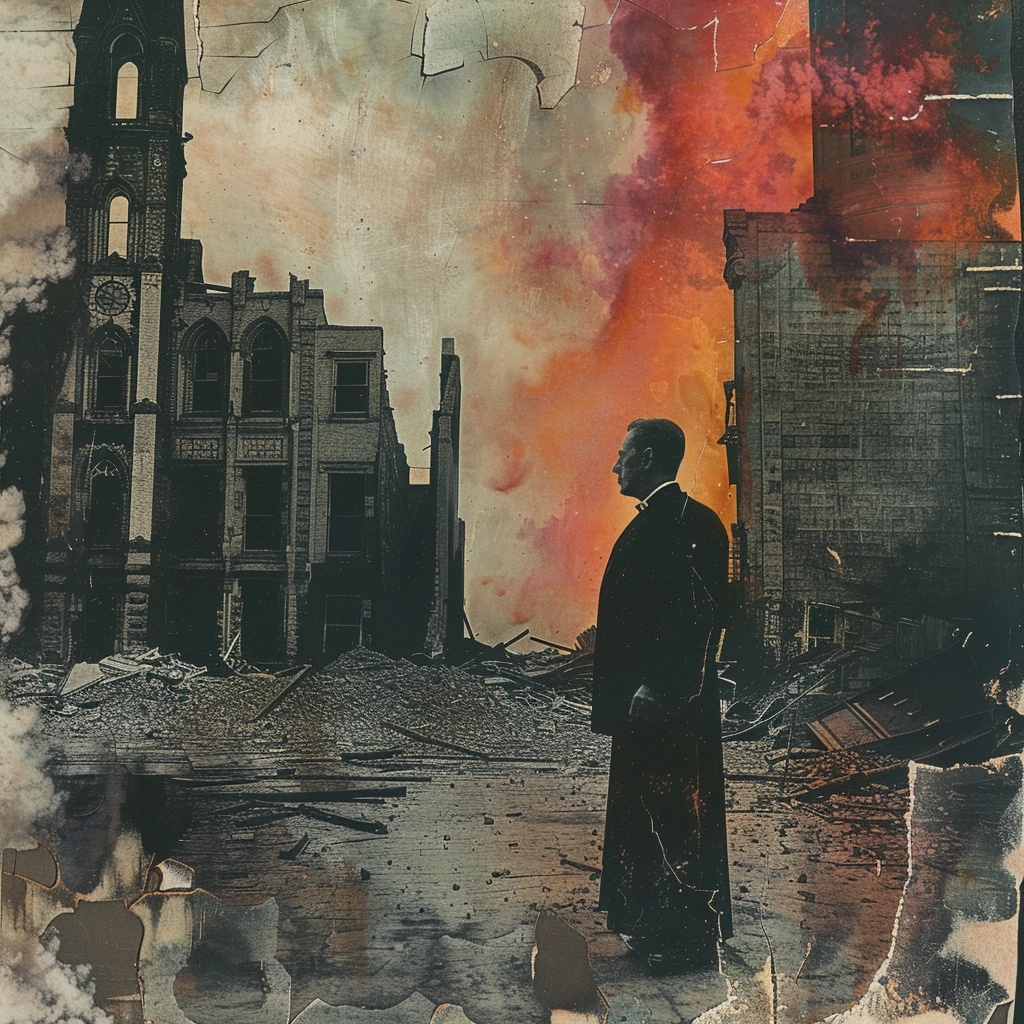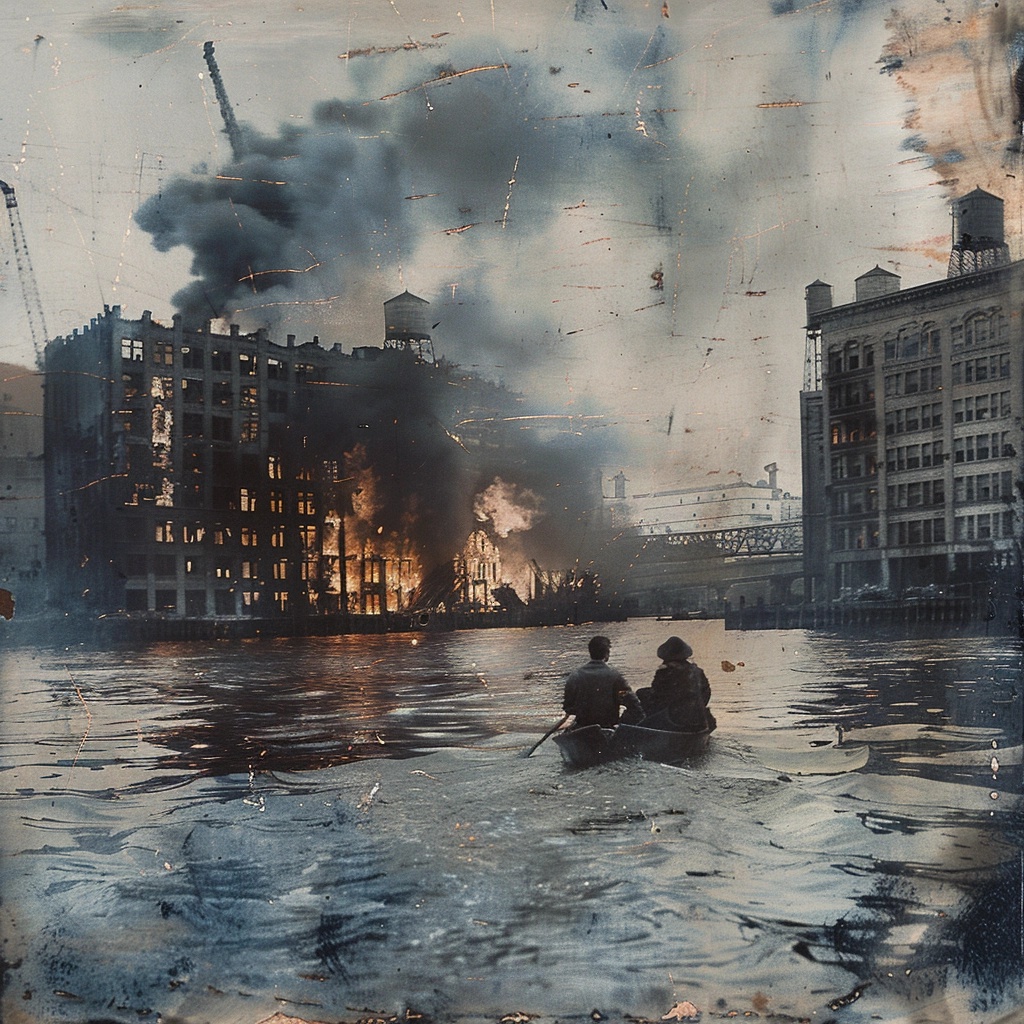THE DOOMSMAN (27)
By:
August 27, 2024

Set ninety years after the cataclysmic pandemic of 1925, Van Tassel Sutphen’s The Doomsman imagines a Kamandi-like future in which medievalized American tribes struggle with the marauding Doomsmen for control of the ruins of New York City… where a mad priest worships a powerful technology. HiLoBooks is pleased to serialize this 1905–1906 proto-sf novel for HILOBROW’s readers.
ALL INSTALLMENTS: 1 | 2 | 3 | 4 | 5 | 6 | 7 | 8 | 9 | 10 | 11 | 12 | 13 | 14 | 15 | 16 | 17 | 18 | 19 | 20 | 21 | 22 | 23 | 24 | 25 | 26 | 27 | 28 | 29 | 30.
DOOMSDAY
Prosper’s start upon Piers Minor and Nanna had been a short one, and under ordinary circumstances he could hardly have retained his advantage. But in her nervous confusion Nanna made two wrong turns, and so many precious moments were wasted.
A quarter of a mile away from the citadel they were halted by the sound of a heavy explosion. Piers Minor spoke his astonishment frankly.
“Thunder on a cool night in May! Who ever heard of such a thing?”
“It is the voice of the Shining One,” said Nanna to herself, and hurried on the faster.
“Yet the lightning must have struck somewhere,” persisted Piers Minor, “for the sky is red. There! look for yourself.”
Half a dozen blocks away to the westward they could see flames shooting from the windows of a warehouse. Its contents must have been highly combustible, for they were burning like chaff in a furnace draught. As they stood and watched the conflagration a second explosion occurred, and so close at hand that the ground seemed to rock beneath their feet. And with that Nanna’s heart grew faint within her, for now she knew certainly that they were too late. The Shining One had spoken, and Doom was falling.
Piers Minor looked at his companion with troubled eyes. What was this devil’s work?
“The Shining One,” she whispered, and clung to his arm. “See how his tongues of fire lick up the dust of Doom.”
“But who is the Shining One?” demanded the young man, wonderingly.
“Listen!”
Deep under the crackling of the flames vibrated the diapason of the great dynamo. Piers Minor turned pale.
“He speaks,” whispered the girl. “And now look, look!”
A little distance away stood one of the ancient telegraph-poles carrying a tangled mass of wire ends. The pole had been swaying dangerously in the rising gale; now with a loud crack it broke off close to the ground and fell so that the wires were brought into naked contact with a copper cable suspended on the opposite side of the street. Instantly the “dead” wires awoke to life, spluttering and hissing like a bunch of snakes; a cataract of yellow-blue sparks poured from the broken ends.
“The tongues of fire,” said Nanna. “You may have seen them devour a single tree in the forest or suck out a man’s life with a touch, but to-night they are hungry and they are eating up the world.”
A terrifying conclusion that was not so far away from the truth. During the last few minutes the area of the conflagration had increased tremendously and the whole central portion of the city, including the Citadel Square, was now a vast furnace in which no life could possibly exist. For the moment the general direction of the wind had shifted, and the flames were not bearing down so rapidly as before upon the two fugitives. They would be in comparative safety for some time yet unless the gale veered back to its former quarter.

“We can never get through to the north,” said Piers Minor.
“There is no necessity,” returned Nanna. “I know of a wharf on the Lesser river where the shad-fishers keep their boats. We can reach it from here in a quarter of an hour.”
“Good,” said Piers Minor, and waited for her to lead the way. Then, as she still held back, he went on, impatiently, “The wind may change at any moment, and it is foolish to wait.”
“It is my sister,” explained the girl. “She is here in the city — a prisoner —” Her voice shook and failed her.
“But what can we do?” asked the young man. “You do not even know — in Quinton Edge’s house, you say? But that is a mile or more away, and the road is already blocked. It is impossible.”
“Yes, I know, but suppose there should be a chance — the hand that has moved the Shining One to strike, may it not be lifted again to repair the evil?”
“I do not understand,” said Piers Minor.
And thereupon Nanna described as clearly as she could the part that Prosper, the priest, had played in the impending tragedy. Surely he might be prevailed upon to avert the judgment from the innocent. He who had released the flames could as easily restrain them. Or, at least, Arcadia House might be spared.
“But where are we to find him?”
Nanna pointed down the street. “There — in the House of Power.”
“Come,” he said, and they went on quickly.
At the entrance to the temple of the Shining One they stopped and listened. The air was all tremulous with the hum of the rapidly revolving dynamos, the thud of the reciprocating machinery, and the grinding of the badly lubricated shafting.
Piers Minor knew that he was horribly afraid, but for very shame he could not hold back. Together they stole a little way within the vaulted entrance and listened again. Nothing but the roar of the machinery. The vast hall would have been in utter darkness save for the glare of the conflagration; as it was, they could see clearly that there was nobody within.
“The little room beyond,” said Nanna, and shivered. These were forbidden sights for a woman’s eyes, and the god would be very angry. Yet it must be done. They joined hands like two children and went forward.
Now they stood, wondering, within the little room with its low ceiling and bare white walls. Could it be that so great a god as the Shining One could dwell here? An empty room, save for the oak chair standing in the middle of the floor and that curious-appearing board fixed against the wall, with its multiplicity of keys, knobs, and levers. That was all, and yet a vague terror laid its hand upon them; they remained motionless and speechless.

Something, some one had entered the room — slow footsteps and the rustle of trailing garments. Then the sound of a lever snapped to its connecting points, and the great, shining face flamed out of the darkness. In his intense absorption, the old priest saw nothing of the two who also waited there. Advancing to the centre of the room, he stood and looked upon the countenance of the Shining One, while a man might count twoscore. Then he spoke, slowly and hesitatingly, as one who excuses himself of grievous fault:
“Let the Shining One be content — it is accomplished. And now, O father, have mercy. For the sins of thy people — a sacrifice —”
With unfaltering step he walked to the great chair and seated himself. Then, in a clear voice, “Lord — if indeed thou art lord —” There was the click of a switch-key; the man’s body half rose from its seat and sank back again.
Piers Minor felt the girl’s dead weight thrown suddenly upon him. “Nanna!” he cried, and she responded bravely, fighting with all her strength against the inflowing tide of faintness. One forward step, taken with infinite precaution, and then another. The stillness remained unbroken.
The great chair stood with its back towards them, and they could not see the seated figure. But Piers Minor caught one glimpse of a hand gripped hard upon the chair arm, and he saw that it was burned hard and black as a coal. Now the door was within reach and they passed out. In the little room, Prosper, the priest, sat upon the knees of the Shining One, and the great, white face looked down upon him.
Not an instant too soon had Piers Minor and Nanna reached the open street. The wind had shifted back to the northwest, and the fire, breaking out in one place after another from the gale-scattered brands, was coming down upon them in great bounds, as though it were some gigantic beast of prey. A suffocating smoke choked their throats and nostrils; they could neither speak nor breathe. Then, by the mercy of God, a fierce counter-current drove the smoke back a little way; they ran at full speed towards the south-east. Now they stopped an instant to refill their panting lungs, then on again, for the air about them was full of flying sparks that stung the unprotected flesh and even burned holes in their clothing of stout woollen. On and on, till their heads felt light as a child’s toy balloon and the blood in their ears pounded like a mill-wheel. Piers Minor stumbled and fell.
“I am blind,” he gasped. “Leave me.” But Nanna would not give over, tugging at the man’s weight until she had him to his feet again, with a convenient railing at his back. She picked up some water from the gutter with her hands held cup-wise, and dashed the liquid in his face. Piers Minor straightened up, and from his eyes the darkness cleared away.
“Courage!” she said, and he smiled back at her.
There was the shining of the river; now they could see the pier and the boats of the shad-fishers lying alongside. Piers Minor cast off the largest and most seaworthy-looking of the lot, and, without troubling to bail out the standing water, he brought the craft broadside to the wharf and held out his hand to Nanna. But she, looking to the northward, where the gilded cupola of Arcadia House shone out against the sky, neither moved nor spoke.
“Come,” he said.
The girl turned. “She is there,” she said, and pointed to the north. “I must go to her — my little sister.”
Piers Minor swung himself up on the wharf and seized her.
“You shall not,” he said.
She tried to wrench herself free; she struck him full in the face. But Piers Minor only smiled grimly and held on the tighter. And then, to his astonishment, this tiger-cat became suddenly metamorphosed into a dove. Her breast heaved, and she turned her head away; he knew that she was weeping just like any other woman. Whereat Piers Minor smiled again, but not grimly, and held her a little closer.
“Listen,” he said, and forced her gently to look at him. “It is impossible to reach Arcadia House; even now the fire is there before you. You must believe that Constans received the message and was able to get there in time. Believe it, because it is I who tell you.”
She did believe, but, being a woman, she hesitated again — at the very brink of surrender.
“Let me go,” she said, in a low tone, and Piers Minor was so astonished that he immediately complied, and stood looking at her helplessly. But when, coloring like a rose and with downcast eyes, she would have passed him, the masculine instinct of possession awoke again; he barred the way determinedly.

A little distance away an enormous brick storehouse was burning fiercely. A tremendous explosion threw a roof bodily into the air; a shower of incandescent particles descended and drove directly at the fugitives. Nanna felt herself lifted bodily off her feet and swept with a rush down the wharf. One little gulp of regret for her lost independence and she yielded — deliciously. The boat rocked from side to side, then it shot out upon the open river.
Piers Minor had stopped rowing, for the sparks no longer fell about them. The spectacle of the burning city was a magnificent one. The inverted bowl of the sky shone as though it were made of copper, and the gale had flattened out the flames horizontally so that they resembled the flying masses of a woman’s unbound hair.
Nanna’s eyes filled with tears.
“It was my world,” she said, softly, “the only one I knew.”
“Nanna!” said Piers Minor. She let her hand rest in his, and the boat floated on.
RADIUM AGE PROTO-SF: “Radium Age” is Josh Glenn’s name for the nascent sf genre’s c. 1900–1935 era, a period which saw the discovery of radioactivity, i.e., the revelation that matter itself is constantly in movement — a fitting metaphor for the first decades of the 20th century, during which old scientific, religious, political, and social certainties were shattered. More info here.
SERIALIZED BY HILOBOOKS: James Parker’s Cocky the Fox | Annalee Newitz’s “The Great Oxygen Race” | Matthew Battles’s “Imago” | & many more original and reissued novels and stories.
